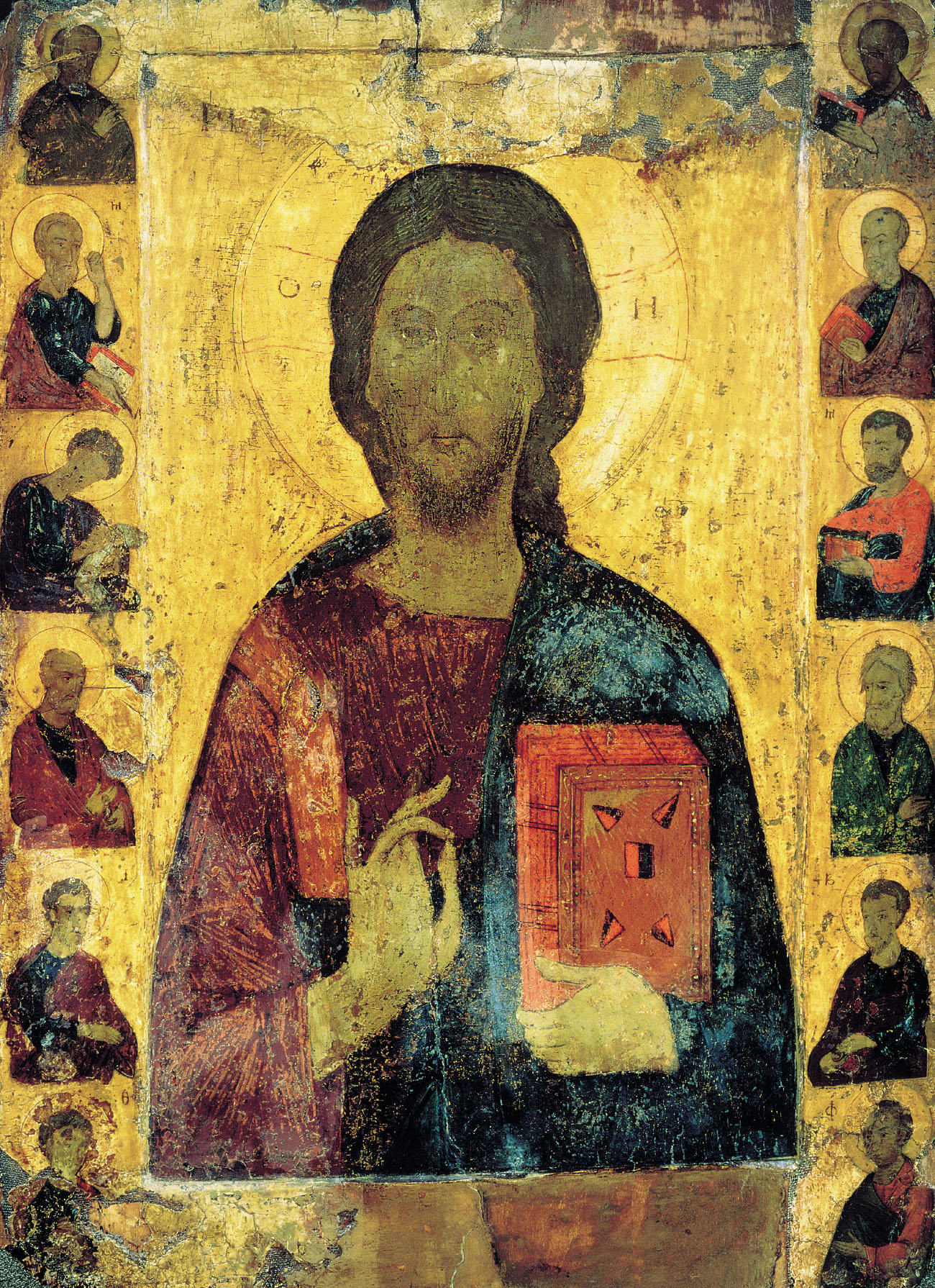
Savior With the Apostles
Early 14th century
Tretyakov Gallery, Moscow
Posted on 06/08/2015 10:35:20 PM PDT by Salvation
Glad to see that you and yours are praying for the Christians in the Middle East... Thank you for that!!
That is what I can do at the present time.
| Matthew | |||
| English: Douay-Rheims | Latin: Vulgata Clementina | Greek NT: Byzantine/Majority Text (2000) | |
| Matthew 5 |
|||
| 13. | You are the salt of the earth. But if the salt lose its savour, wherewith shall it be salted? It is good for nothing any more but to be cast out, and to be trodden on by men. | Vos estis sal terræ. Quod si sal evanuerit, in quo salietur ? ad nihilum valet ultra, nisi ut mittatur foras, et conculcetur ab hominibus. | υμεις εστε το αλας της γης εαν δε το αλας μωρανθη εν τινι αλισθησεται εις ουδεν ισχυει ετι ει μη βληθηναι εξω και καταπατεισθαι υπο των ανθρωπων |
| 14. | You are the light of the world. A city seated on a mountain cannot be hid. | Vos estis lux mundi. Non potest civitas abscondi supra montem posita, | υμεις εστε το φως του κοσμου ου δυναται πολις κρυβηναι επανω ορους κειμενη |
| 15. | Neither do men light a candle and put it under a bushel, but upon a candlestick, that it may shine to all that are in the house. | neque accedunt lucernam, et ponunt eam sub modio, sed super candelabrum, ut luceat omnibus qui in domo sunt. | ουδε καιουσιν λυχνον και τιθεασιν αυτον υπο τον μοδιον αλλ επι την λυχνιαν και λαμπει πασιν τοις εν τη οικια |
| 16. | So let your light shine before men, that they may see your good works, and glorify your Father who is in heaven. | Sic luceat lux vestra coram hominibus : ut videant opera vestra bona, et glorificent Patrem vestrum, qui in cælis est. | ουτως λαμψατω το φως υμων εμπροσθεν των ανθρωπων οπως ιδωσιν υμων τα καλα εργα και δοξασωσιν τον πατερα υμων τον εν τοις ουρανοις |

Saint Ephrem, Deacon & Doctor of the Church
Optional Memorial
June 9th
The Dormition of St. Ephrem, from Iveron Monastery on the Holy Mountain
Virtues are formed by prayer. Prayer preserves temperance. Prayer suppresses anger. Prayer prevents emotions of pride and envy. Prayer draws into the soul the Holy Spirit, and raises man to Heaven. -- Saint Ephraem
Saint Ephrem was born in Mesopotamia and ordained as a deacon of Edessa in whatis now Turkey, he vigorously combated the heresies of his time by writing poems and hymns about the Mysteries of Christ and the Blessed Virgin. He had a great devotion to Our Lady, and was in large part responsible for introducing hymns to public worship.
Source: Daily Roman Missal, Edited by Rev. James Socías, Midwest Theological Forum, Chicago, Illinois ©2003
Collect:
Pour into our hearts O Lord, we pray, the Holy Spirit,
at whose prompting the Deacon Saint Ephrem
exulted in singing of your mysteries
and from whom he received the strength
to serve you alone.
Through our Lord Jesus Christ, your Son,
who lives and reigns with you in the unity of the Holy Spirit,
One God, for ever and ever. +Amen.
First Reading: Colossians 3:12-17
Put on then, as God's chosen ones, holy and beloved, compassion, kindness, lowliness, meekness, and patience, forbearing one another and, if one has a complaint against another, forgiving each other; as the Lord has forgiven you, so you also must forgive. And above all these put on love, which binds everything together in perfect harmony. And let the peace of Christ rule in your hearts, to which indeed you were called in the one body. And be thankful. Let the word of Christ dwell in you richly, teach and admonish one another in all wisdom, and sing psalms and hymns and spiritual songs with thankfulness in your hearts to God. And whatever you do, in word or deed, do everything in the name of the Lord Jesus, giving thanks to God the Father through Him.
Gospel Reading: Luke 6:43-45
"For no good tree bears bad fruit, nor again does a bad tree bear good fruit; for each tree is known by its own fruit. For figs are not gathered from thorns, nor are grapes picked from a bramble bush. The good man out of the good treasure of his heart produces good, and the evil man out of his evil treasure produces evil; for out of the abundance of the heart his mouth speaks.
Prayer for Strength in Weakness
Lord Jesus Christ, King of kings, you have power over life and death. You know even things that are uncertain and obscure, and our very thoughts and feelings are not hidden from you. Cleanse me from my secret faults, and I have done wrong and you saw it. You know how weak I am, both in soul and in body. Give me strength, O Lord, in my frailty and sustain me in my sufferings. Grant me a prudent judgement, dear Lord, and let me always be mindful of your blessings. Let me retain until the end your grace that has protected me till now.
St Ephrem of Syria, Deacon, Poet and Doctor
Related Links on the Vatican Website:
PRINCIPI APOSTOLORUM PETRO, Encyclical of Pope Benedict XV on St. Ephrem, October 5, 1920
Benedict XVI, General Audience, Paul VI Audience Hall, Wednesday, November 28, 2007, Saint Ephrem
Related Links on New Advent website:
Saint Ephraim the Syrian
- Nisibene Hymns
- Miscellaneous Hymns -- On the Nativity of Christ in the Flesh, For the Feast of the Epiphany, and On the Faith ("The Pearl")
- Homilies -- On Our Lord, On Admonition and Repentance, and On the Sinful Woman
Feast Day: June 9
Born: 306 at Nisibis, Mesopotamia (in modern Syria)
Died: 9 June 373 at Edessa (in modern Iraq)
Patron of: Spiritual directors and spiritual leaders
St. Ephrem
Feast Day: June 09
Born: 306 :: Died: 373
Ephrem was born at Nisibis in Mesopotamia (which is now Syria) and was born in a pagan family. Pagans are people who believe in false gods. When he was a teenager, he heard St. James preach about how Jesus had died for us so we could be saved. At the age of eighteen Ephrem asked to be baptized and joined the Catholic Church.
Ephrem then went into the hills found himself a cave near the city of Edessa in Syria and became a hermit. His clothes were just patched rags and he ate any fruit, vegetable or edible leaves that he could find.
Ephrem became angry easily but prayed sincerely about it. He slowly learnt to control his temper. People who met him thought he was just naturally very calm. He often went to preach in Edessa and Nisibis. When he spoke about God's judgment, the people wept.
He would tell them that he was a great sinner. He really meant it, too, because although his sins were small, they seemed very big to him. When St. Basil met him, he asked, "Are you Ephrem, the famous servant of Jesus?" Ephrem answered quickly, "I am Ephrem who walks unworthily on the way to salvation." Then he asked for and received advice from St. Basil on how to grow in the spiritual life.
Ephrem was made deacon of Edessa and spent his time writing spiritual books. He wrote in several languages - Syriac, Greek, Latin and Armenian. These works are so beautiful and spiritual that they have been translated into many languages and are read even today.
Ephrem also wrote hymns for public worship and introduced singing during the Mass. These hymns became very popular. As the people sang them, they learned much about the faith. That is why he is called "the harp of the Holy Spirit." Because he was such a great teacher through his writings, in 1920 he was proclaimed a Doctor of the Church.
Ephrem died in June, 373, at Edessa (which is now in Iraq).
Tuesday, June 9
Liturgical Color: Green
Today is the feast of Mary, Virgin Mother
of Divine Grace. We receive increased
grace when we follow God's plan for us.
Mary provides the ultimate model of how
we can grow closer to God by
cooperating with His Divine Will.
|
|
1 On a sabbath, while he was going through the grain fields, his disciples plucked and ate some heads of grain, rubbing them in their hands. 2 But some of the Pharisees said, "Why are you doing what is not lawful to do on the sabbath?" 3 And Jesus answered, "Have you not read what David did when he was hungry, he and those who were with him: 4 how he entered the house of God, and took and ate the showbread, which it is not lawful for any but the priests to eat, and also gave it to those with him?" 5 And he said to them, "The Son of man is lord of the sabbath."
6 On another sabbath, when he entered the synagogue and taught, a man was there whose right hand was withered. 7 And the scribes and the Pharisees watched him, to see whether he would heal on the sabbath, so that they might find an accusation against him. 8 But he knew their thoughts, and he said to the man who had the withered hand, "Come and stand here." And he rose and stood there. 9 And Jesus said to them, "I ask you, is it lawful on the sabbath to do good or to do harm, to save life or to destroy it?" 10 And he looked around on them all, and said to him, "Stretch out your hand." And he did so, and his hand was restored. 11 But they were filled with fury and discussed with one another what they might do to Jesus.
Have you not read: The question is intentionally sarcastic and would be taken as an insult by the well educated Pharisees.
is it lawful: Jesus unmasks his opponents with a question: Is the Sabbath day for good or harm? The implied answer is obvious (for good) and designed to expose the malice of the Pharisees (6:7). For regardless of what Jesus does, they are already planning to harm him. In the end, it is the Pharisees who violate the Sabbath and walk straight into their own trap.
June 9, 2015 by Dan Burke
Presence of God – O Jesus, help me to penetrate the mystery of Your infinite love, which constrained You to become our Food and Drink.
MEDITATION
All God’s activity for man’s benefit is a work of love; it is summed up in the immense mystery of love which causes Him, the sovereign, infinite Good, to raise man to Himself, making him, a creature, share in His divine nature by communicating His own life to him. It was precisely to communicate this life, to unite man to God, that the Word became Incarnate. In His Person the divinity was to be united to our humanity in a most complete and perfect way; it was united directly to the most sacred humanity of Jesus, and through it, to the whole human race. By virtue of the Incarnation of the Word and of the grace He merited for us, every man has the right to call Jesus his Brother, to call God his Father and to aspire to union with Him. The way of union with God is thus opened to man. By becoming incarnate and later dying on the Cross, the Son of God not only removed the obstacles to this union, but He also provided all we need to gain it, or rather, He Himself became the Way. Through union with
Jesus, man is united to God.
It is not surprising that the love of Jesus, surpassing all measure, impelled Him to find a means of uniting Himself to each one of us in the most intimate and personal manner; this He found in the Eucharist. Having become our Food, Jesus makes us one with Him, and thus makes us share most directly in His divine life, in His union with the Father and with the Trinity.
By assuming our flesh in the Incarnation, the Son of God united Himself once and for all with the human race. In the Eucharist, He continues to unite Himself to each individual who receives Him. Thus we can understand how the Eucharist, according to the mind of the Fathers of the Church, may really be “considered as a continuation and extension of the Incarnation; by it the substance of the Incarnate Word is united to every man” (cf Mirae Caritatis paragraph 7).
COLLOQUY
“O eternal Trinity! O fire and abyss of charity! How could our redemption benefit You? It could not, for You, our God, have no need of us. To whom then comes this benefit? Only to man. O inestimable charity! Even as You, true God and true Man, gave Yourself entirely to us, so also You left Yourself entirely for us, to be our food, so that during our earthly pilgrimage we would not faint with weariness, but would be strengthened by You, our celestial Bread. O man, what has your God left you? He has left you Himself, wholly God and wholly Man, concealed under this whiteness of bread. O fire of love! Was it not enough for You to have created us to Your image and likeness, and to have re-created us in grace through the Blood of Your Son, without giving Yourself wholly to us as our Food, O God, Divine Essence? What impelled You to do this? Your charity alone. It was not enough for You to send Your Word to us for our redemption; neither were You content to give Him to us as our Food, but in the excess of Your love for Your creature, You gave to man the whole divine essence. And not only, O Lord, do You give Yourself to us, but by nourishing us with this divine Food, You make us strong with Your power against the attacks of the demons, insults from creatures, the rebellion of our flesh, and every sorrow and tribulation, from whatever source it may come.
“O Bread of Angels, sovereign, eternal purity, You ask and want such transparency in a soul who receives You in this sweet Sacrament, that if it were possible, the very angels would have to purify themselves in the presence of such an august mystery. How can my soul become purified? In the fire of Your charity, O eternal God, by bathing itself in the Blood of Your only-begotten Son. O wretched soul of mine, how can you approach such a great mystery without sufficient purification? I will take off, then, the loathsome garments of my will and clothe myself, O Lord, with Your eternal will!” (St. Catherine of Siena).
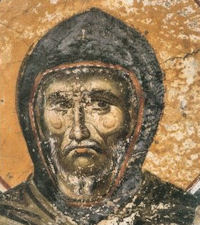
Daily Readings for:June 09, 2015
(Readings on USCCB website)
Collect: Pour into our hearts O Lord, we pray, the Holy Spirit, at whose prompting the Deacon Saint Ephrem exulted in singing of your mysteries and from whom he received the strength to serve you alone. Through our Lord Jesus Christ, your Son, who lives and reigns with you in the unity of the Holy Spirit, one God, for ever and ever.
RECIPES
o Bannock
o Bannocks
ACTIVITIES
o Religion in the Home for Preschool: June
PRAYERS
o June Devotion: The Sacred Heart
o Efficacious Novena to the Sacred Heart of Jesus
LIBRARY
o Principi Apostolorum Petro (On St. Ephrem the Syrian) | Pope Benedict XV
o St. Ephrem | Pope Benedict XVI
· Ordinary Time: June 9th
· Optional Memorial of St. Ephrem, deacon and doctor
Old Calendar: Saints Primus and Felician, martyrs; St. Columba
St. Ephrem, called "the Harp of the Holy Spirit," is the great classic Doctor of the Syrian church. As deacon at Edessa, he vigorously combated the heresies of his time, and to do so more effectively wrote poems and hymns about the mysteries of Christ, the Blessed Virgin and the saints. He had a great devotion to Our Lady. He was a commentator on Scripture and a preacher as well as a poet, and has left a considerable number of works, which were translated into other Eastern languages as well as into Greek and Latin. He died in 373. Benedict XV proclaimed him a Doctor of the Church in 1920.
According to the 1962 Missal of St. John XXIII the Extraordinary Form of the Roman Rite, today is the feast of Sts. Primus and Felician as well as St. Columba. St. Ephrem's feast is celebrated on June 18.
Primus and Felician are two Roman martyrs of the via Nomentana. Their relics, transferred in the seventh century within the city, are at present in the church of St. Stephen on the Coelian Hill.
St. Columba, or Columkill, apostle of the Picts, was of illustrious Irish descent. He was brought up in the company of many saints at the school of St. Finian of Clonard. Being an ordained priest, and having founded many churches in Ireland, he went to Scotland with twelve companions, and there converted many of the northern Picts to the faith of Christ. He founded the monastery of Iona which became the nursery of saints and apostles. He also evangelized the northern English. He died on June 9, 597 at the foot of the altar at Iona while blessing his people, and was buried, like St. Brigid, beside St. Patrick at Downpatrick in Ulster.
St. Ephrem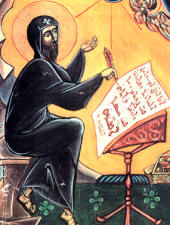 Ephrem was of Syrian descent and son of a citizen of Nisibis. While yet a young man be betook himself to the holy bishop James, by whom he was baptized, and he soon made such progress in holiness and learning as to be appointed master in the school of Nisibis in Mesopotamia. After the death of the bishop James, Nisibis was captured by the Persians, and Ephrem went to Edessa, where he settled first among the monks in the mountains. Later, to avoid the company of those who flocked to him, he adopted the eremitical life. He was made deacon of the church of Edessa, but refused the priesthood out of humility. He was rich in all virtues and strove to acquire piety and religion by the following of true wisdom. He placed all his hope in God, despised all human and transitory things, and was ever filled with the earnest desire of those which are divine and eternal.
Ephrem was of Syrian descent and son of a citizen of Nisibis. While yet a young man be betook himself to the holy bishop James, by whom he was baptized, and he soon made such progress in holiness and learning as to be appointed master in the school of Nisibis in Mesopotamia. After the death of the bishop James, Nisibis was captured by the Persians, and Ephrem went to Edessa, where he settled first among the monks in the mountains. Later, to avoid the company of those who flocked to him, he adopted the eremitical life. He was made deacon of the church of Edessa, but refused the priesthood out of humility. He was rich in all virtues and strove to acquire piety and religion by the following of true wisdom. He placed all his hope in God, despised all human and transitory things, and was ever filled with the earnest desire of those which are divine and eternal.
He was led by the Spirit of God to Caesarea in Cappadocia, where he saw Basil, the mouthpiece of the Church, and they obtained benefit from their mutual intercourse. In order to refute the many errors which troubled the Church at that time, and to expound the mysteries of Jesus Christ, he wrote many books in the Syrian tongue, almost all of which have been translated into Greek. St. Jerome bears witness that he attained such fame that his writings were read publicly in the churches after the reading from the Holy Scriptures.
On account of his works, so full of the light of heavenly doctrine, he was greatly honored even during his lifetime as a Doctor of the Church. He composed a poem in praise of the Blessed Virgin Mary and the saints for which he was called by the Syrians "the Harp of the Holy Ghost." He was noted for his great and tender devotion towards the immaculate Virgin. He died, rich in merits, at Edessa in Mesopotamia, on the fourteenth of the Kalends of July, in the reign of Valens. Pope Benedict XV, at the instance of many Cardinals of the holy Roman Church, patriarchs, archbishops, bishops, abbots and religious communities, declared him by a decree of the Sacred Congregation of Rites to be a Doctor of the Universal Church.
Excerpted from The Liturgical Year, Abbot Gueranger O.S.B.
Patron: Spiritual directors; spiritual leaders.
Symbols: cowl with small cross; pillar of light; scourge.
Often portrayed: In monastic habit; lying on a funeral slab; with a scroll and vine, as a deacon.
Things to Do:
Sts. Primus and Felician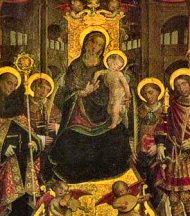 At an advanced age the brothers Primus and Felician were beheaded at Nomentum (or Mentana). According to the legendary Acts of their martyrdom, they were thrown into prison by Diocletian. Felician was separated from his brother and subjected to cruel tortures. Then the magistrate called for Primus. "See," he said, "your brother has acted much more wisely than you; he listened to the emperor's wishes and now enjoys the greatest honor with him. If you follow his example, like consideration and favor will be shown you." Primus retorted: "What has happened to my brother, an angel has told me. Oh, that I, even as I am one in mind and heart with him, may not be separated from him in death!"
At an advanced age the brothers Primus and Felician were beheaded at Nomentum (or Mentana). According to the legendary Acts of their martyrdom, they were thrown into prison by Diocletian. Felician was separated from his brother and subjected to cruel tortures. Then the magistrate called for Primus. "See," he said, "your brother has acted much more wisely than you; he listened to the emperor's wishes and now enjoys the greatest honor with him. If you follow his example, like consideration and favor will be shown you." Primus retorted: "What has happened to my brother, an angel has told me. Oh, that I, even as I am one in mind and heart with him, may not be separated from him in death!"
Both were then thrown to the lions, but the beasts crouched at their feet, fawning with head and tail. Of the twelve thousand persons who witnessed this marvel, five hundred together with their families embraced the faith. Finally the two brothers were beheaded.
Excerpted from The Church's Year of Grace, Pius Parsch
Things to Do:
St. Columba of Iona, Abbot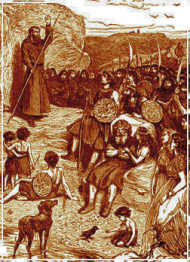 St. Columba is a saint who still, after fourteen hundred years, exerts an appeal upon our imaginations. Born in Ireland, in Donegal in the year 521, he was of the blood royal, and might indeed have become High King of Ireland had he not chosen to be a priest. His vital, vigorous personality has given rise to many legends, and it is a little hard to sift fact from what is more probably fiction. We do know that he was a man of tremendous energy, probably somewhat headstrong in his youth, but with his tendency to violence curbed by a gentle magnanimity.
St. Columba is a saint who still, after fourteen hundred years, exerts an appeal upon our imaginations. Born in Ireland, in Donegal in the year 521, he was of the blood royal, and might indeed have become High King of Ireland had he not chosen to be a priest. His vital, vigorous personality has given rise to many legends, and it is a little hard to sift fact from what is more probably fiction. We do know that he was a man of tremendous energy, probably somewhat headstrong in his youth, but with his tendency to violence curbed by a gentle magnanimity.
It seems certain that he left Ireland as an act of penance, although it is less certain how far this was connected with his quarreling over a copy of the Gospels he had made, a dispute that led to a bloody battle. He came from Ireland to Scotland, to the colony of Dalriada founded on the west coast by his fellow Irish Scots who were at that time somewhat oppressed by the dominant Picts. With twelve companions he founded his monastery on Iona in the year 563. These Celtic monks lived in communities of separate cells, but Columba and his companions combined their contemplative life with extraordinary missionary activity. Amongst his many accomplishments, Columba was a splendid sailor. He sailed far amongst the islands and traveled deep inland, making converts and founding little churches. In Ireland he had already, it is said, founded a hundred churches.
Of all the Celtic saints in Scotland, Columba's life is much the best documented, because manuscripts of his life, written by St Adamnan, one of his early successors as abbot of Iona, have survived. Iona itself remains a place of the greatest beauty, a serene island set in seas that take on brilliant colors in the sunshine, recalling the life and background of this remarkable man whose mission led to the conversion of Scotland and of the north of England, and indeed carried its influence far further afield. It later became the site of a Benedictine Abbey and of a little cathedral. These were dismantled by the Scottish reformers in 1561, and part of Columba's prophecy was fulfilled:
In Iona of my heart, Iona of my love,
Instead of monks' voices shall be lowing of cattle,
But ere the world come to an end
Iona shall be as it was.
When Dr Samuel Johnson visited the island in 1773 he observed, 'That man is little to be envied, whose patriotism would not gain force upon the plain of Marathon, or whose piety would not grow warmer among the ruins of Iona!'
Columba was a poet as well as a man of action. Some of his poems in both Latin and Gaelic have come down to us, and they reveal him as a man very sensitive to the beauty of his surroundings, as well as always, in St Adamnan's phrase, 'gladdened in his inmost heart by the joy of the Holy Spirit.' He died in the year 597.
Courtesy of the Catholic Information Network
Patron: Against floods; bookbinders; floods; Ireland; poets; Scotland.
Symbols: Coracle; white horse; Celtic cross; devils fleeing.
Things to Do:
Day of Colum Cille the beloved
Day to put the loom to use
Day to put sheep to pasture
Day to put coracle on the seas
Day to bear, day to die
Day to make prayer efficacious
Day of my beloved, the Thursday. (Carmina Gadelica)
The healing herb, St. John's Wort, which flowers around summer solstice, is his herb. In Norway, this is considered the day the salmon start leaping.
 Also known as
Also known as
Profile
May have been the son of a pagan priest. Brought to the faith by Saint James of Nisibis, and baptized at age 18. Helped to evangelize Nisibis, Mesopotamia. May have attended the Council of Nicaea in 325. Deacon. Preacher. Had a great devotion to the Blessed Virgin Mary. In 363 Nisibis was ceded to Persia; a great persecution of Christians began, and Eprem led an exodus of the faithful to Edessa. Founded a theological school in Edessa. Wrote homilies, hymns and poetry. Helped introduce the use of hymns in public worship. Fought Gnosticism and Arianism by his writings, including poems and hymns. Proclaimed a Doctor of the Church in 1920.
Born
Name Meaning
Additional Information
Readings
Virtues are formed by prayer. Prayer preserves temperance. Prayer suppresses anger. Prayer prevents emotions of pride and envy. Prayer draws into the soul the Holy Spirit, and raises man to Heaven. – Saint Ephraem
Remember me, you heirs of God, you brethren of Christ; supplicate the Savior earnestly for me, that I may be freed through Christ from him that fights against me day by day. – Saint Ephrem, The Fear at the End of Life
You victorious martyrs who endured torments gladly for the sake of the God and Savior, you who have boldness of speech toward the Lord himself, you saints, intercede for us who are timid and sinful men, full of sloth, that the grace of Christ may come upon us, and enlighten the hearts of all of us that so we may love him. – Saint Ephrem, from Commentary on Mark
Lord, shed upon our darkened souls the brilliant light of your wisdom so that we may be enlightened and serve you with renewed purity. Sunrise marks the hour for men to begin their toil, but in our souls, Lord, prepare a dwelling for the day that will never end. Through our unremitting zeal for you. Lord, set upon us the sign of your day that is not measured by the sun. In your sacrament we daily embrace you and receive you into our bodies; make us worthy to experience the resurrection for which we hope. Teach us to find our joy in your favor! Savior, your crucifixion marked the end of your mortal life; teach us to crucify ourselves and make way for our life in the Spirit. – from a sermon by Saint Ephrem
Daily Marriage Tip for June 9, 2015:
“There are different forms of service but the same Lord.” (1 Cor. 12:5) Equality doesn’t mean sameness. As men and women, we are equal, but have unique talents and personalities. How do your spouse’s gifts serve your family and the community?
| True Leadership | ||
|
||
|
June 9, 2015. Tuesday of the Tenth Week in Ordinary Time
|
||
|
|
||
|
By Father Shawn Aaron, LC Matthew 5:13-16 Jesus said to his disciples: "You are the salt of the earth; but if salt has lost its taste, how can its saltiness be restored? It is no longer good for anything, but is thrown out and trampled underfoot. You are the light of the world. A city built on a hill cannot be hid. No one after lighting a lamp puts it under the bushel basket, but on the lamp stand, and it gives light to all in the house. In the same way, let your light shine before others, so that they may see your good works and give glory to your Father in heaven." Introductory Prayer: Father of love, source of all blessings, you have led me throughout my life, and you lead me still. Thank you for your paternal care. Jesus, Son of God, you died for me on the cross to pay for my sins and manifest your unconditional love for me. Thank you for showing me the way home to the Father. Holy Spirit, sweet guest of the soul, you heal me and strengthen me and set me on fire from the most intimate depths of my soul. Thank you for your loving presence within me. Petition: Lord, show me where I can make a difference.
Conversation with Christ: Lord, you have given me everything I need to be faithful. Grant me also the courage and the zeal to live what I believe and to testify to your faithful love in my thoughts, words and actions. Mother Most Pure, make my heart only for Jesus. Resolution: Today I will speak to someone about Jesus, backing up my words with the sincerity with which I live my Christian commitments. |
June 9, 2015
“You are the salt of the earth” Recently one of the shows of the History channel showed how a common product such as salt is used for a lot of things. Salt enhances the flavor in our dishes to give us that desired taste. At the time when refrigeration was not yet a common thing, salt was used to transport ice from the northern continents to higher temperature countries so that they can enjoy their drinks. Salt was also used to preserve produce such as meat and fish. Such a simple product and yet so many important and wonderful uses.
Oftentimes we question our individual roles in the world. Some know immediately what roles they are destined to play. Others, however, seem to be still searching for meaning in their lives, day in and day out. No matter how simple our lifestyle may be, each and everyone of us has a role to play. We do not have to be CEOs or occupy high level positions in government to contribute. Being a father or a mother, a traffic aide, a teacher, or whatever we may be, each one of us has a significant role to play.
Salt is made up of tiny crystals. Each piece adds that flavor. If each particle fails to be salty, then the taste of the dish would fall flat. Jesus addresses this message – about being salty – to all of us. No one should feel that he is not worthy to be part of God’s kingdom.
This was what St. José de Anchieta (1534 – 1597) did for Brazil. Born in the Canary Islands, this Spanish Jesuit missionary became the father of Brazilian literature. He was instrumental in introducing the Catholic faith to the local Indians. He has been recognized as one of the founders of Sao Paulo in 1554 and Rio de Janeiro in 1565. He lived as “salt” for the Gospel message to the people of Brazil. He was declared a saint by Pope Francis on 03 April 2014.
Through the intercession of St. Jose de Anchieta, may we make our contribution to the betterment of society today.
Language: English | Español
All Issues > Volume 31, Issue 4
|
||||||||||||||||||||||||||||||||||||||||

Please be one of the many who oppose abortion!
– Saint Ephrem of Syria
Disclaimer: Opinions posted on Free Republic are those of the individual posters and do not necessarily represent the opinion of Free Republic or its management. All materials posted herein are protected by copyright law and the exemption for fair use of copyrighted works.